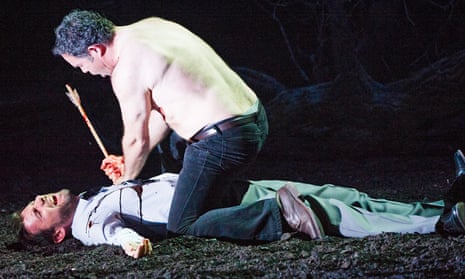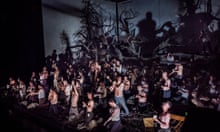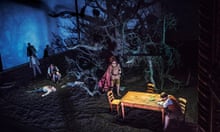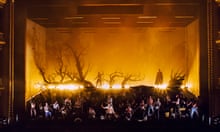The opera world is not very porous. When, on the first night of Guillaume Tell at the Royal Opera House earlier this week, people booed at the rape scene, at one point drowning out the music, and critics busted it from a four-star down to a one-star, and people bemoaned a huge range of things about modern life, from the sensibilities of its major opera players to the attention-seeking traits of its audiences, they were not objecting to the depiction of sexual violence for the reasons that you or I would. Well, not for the reasons I would, anyway.
“I was dreading it, to be honest. Regietheater and all that,” said Juliette after Thursday’s performance. (German for “director’s theatre”, which is opera code for “people making you look at things you don’t want to see” – even their codes are coded through other languages). “I gather they covered her in a sheet, for tonight’s performance. She was naked before. But I loved it.” (I dispensed with the normal practice of asking for people’s ages. When I asked their names, some people looked at me as though I’d asked for their pin number).
Even with the woman under a sheet, it was one of the more horrible things I’ve ever seen in a live environment. But we’ll come to that.
Odile Celine, who was with Juliette, said: “I had read all the blurb, of course, and I’m glad I did. If I hadn’t, I would have thought it was a little beaucoup.”
If I were complaining about a rape scene, it would be because an act of violence against women had been turned into something titillating. This scene wasn’t titillating in the least: a woman is threatened, jeered and gang raped. It was horrible and humiliating and, I thought, true to the nature of a violation and not sensationalist.
But of course that’s a subjective judgment and some audience members, on Twitter at least, did think it had been done for the thrill. The main complaint, though, was that it jarred with a very jaunty, brassy piece of music. Therefore, it cannot have been what the composer intended, since the music made the scene harder to watch, and the scene made the music unsettling, disgusting even, to hear.
They weren’t offended on behalf of women; they were offended on behalf of the composer Gioachino Rossini.
Harry Ross, a librettist and former opera director, whom I spoke to separately, said: “On the continent, this is quite normal, for people to push the boundaries. And you’ll also get people who’ll drive for three hours across Germany to hear a piece of music. I think this was valid, and the fact that people are so up-in-arms about it shows that we’re a parochial nation. On the continent, when people boo, it’s because it’s rubbish. Here, it’s because they’re offended. It’s pathetic!”
He advised me to speak to Kathinka Parsveer, the widow of the composer Karlheinz Stockhausen, the “link to the great 20th century tradition of controversialism”. Parsveer, incredibly (well, it seemed incredible to me), sent me her thoughts by email. “I think music should always be spiritually uplifting and should make us more and more refined, and I do not think rape is something I would like to listen to or look at. But that is my personal feeling!”
This was echoed by many people; that they inhabit the world of the composer in order to be amidst humanity at its most cultivated. It’s not really about offence-taking, it’s more that any brutal act will remind you instead of your species at its basest.
“But the music, the music is wonderful!” a lot of people remarked, leaving unspoken, “shame about the rape”. Angela, afterwards, objected not to the rape per se but to the blood and the mud. “They overdid it. I’m glad they didn’t do the rape very graphically. Everybody knows what happens in war.”
Yet opera is absolutely rammed with brutality. I can’t imagine what creative purpose would be served by working on the basis that everyone already knows what ugliness looks like. There is an abiding suspicion, particularly in English opera, of directing that is considered attention-seeking: that anything which doesn’t put the music first is a betrayal.
Raymond Yiu, a composer and pianist whom I also interviewed by email, hadn’t seen Guillaume Tell so wasn’t commenting specifically on it. He explained broadly: “I don’t think presenting graphic violence in an opera is a problem as long as it is dramatically necessary, not purely for shock value. There were graphic murders in operas before and I have not heard people bitching about it. Why would a gang rape scene trigger such outcry? Is killing someone not as bad a crime as raping?”
Here there does seem to be a propriety element to the upset; the Times reviewer actually complained that there were children in the audience! And that is a true but extremely telling version of taste and morality; that a depiction of murder is something that, while it would not be pleasant for a child (let’s park for a moment why you would take a child to a five-hour opera), everyone needs to incorporate into their understanding of the human condition, but rape is just culturally unnecessary.
But is it? If sexual violence is the currency of oppression, if it’s the engine of the uprising, as it is in Guillaume Tell, is it so wrong to mention it? I’m leaning to the view that this performance was actually magnificent. I didn’t mind the mud.
Behind me, a woman was seeing the performance for the second time, purely because the booing had ruined it the first time. “I mean, it was very uncomfortable, and upsetting. But that’s the point of it.”
I turned round, meaning to talk to her (it had finished) when a man on the same row reared back. “Oh, I thought you were younger. Much younger. Almost a child. I thought it was your first time at the opera.” Huh, I said. Why? “Because you kept wriggling!” As I say, not a very porous world.





